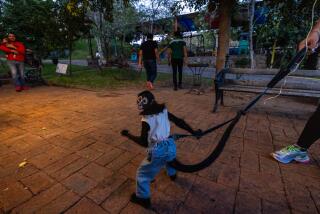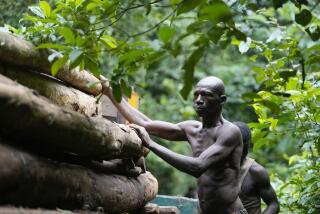Venezuelan Wonderland Under Siege
- Share via
CARACAS, Venezuela — The Orinoco turtle was nearly extinct, so environmental officials dispatched agents to guard the tiny sand islands in the mighty Orinoco River where females lay their eggs.
But instead of protecting the mothers and their eggs, the agents sold them to restaurant owners who used them for turtle soup.
Environmentalists say the theft two years ago nearly destroyed efforts to save the country’s most endangered species and the largest freshwater turtle in South America.
Venezuela’s Amazon rain forests, sprawling plains, snowcapped Andean mountains and Caribbean coral reefs feature some of the world’s most exotic wildlife. But this modern Eden is in peril. The Environmental Ministry is understaffed, underpaid, rife with corruption and mired in confusion, according to environmentalists.
“There’s no law enforcement for anything,” said Clemencia Rodner of the Venezuelan Audubon Society. “It’s total, absolute chaos.”
On the country’s highways, poachers openly sell endangered tropical parrots. Lake Maracaibo, the largest lake in South America, has become a “garbage pail” of oil and waste from tankers, says environmentalist Anna Ponte.
Thousands of illegal gold miners uproot trees in Venezuela’s rain forests with hydraulic water pumps and poison rivers with mercury. National Guardsmen in charge of evicting them instead extort money from them, Ponte says.
Prized coral reefs in Morrocoy National Park turned gray and died four years ago. Scientists don’t rule out a natural phenomenon, but environmentalists blame toxic wastes dumped by ships.
Government officials acknowledge that environmental protection has slipped badly. But they say President Hugo Chavez’s new administration is determined to end the deterioration.
“It’s a disaster, but we’re trying to recover our authority so we can enforce the law,” Environmental Minister Jesus Arnaldo Perez said.
Venezuela was once a leader in environmental protection. It created Latin America’s first environmental ministry in 1977 and has designated one-third of the nation as parks or reserves.
The country is home to neon-colored butterflies, freshwater dolphins, jaguars, tapirs, red howler monkeys, black and yellow frogs, giant anteaters, the world’s largest eagle and the world’s largest rodent, the capybara.
But enforcement of environmental laws, which was never strong, has deteriorated in recent years.
Controversy erupted again in October when Pemon Indians knocked down several towers that are part of a high-voltage electricity line the government is building in rain forests in southeast Venezuela that are supposed to be protected by environmental laws.
The line passes through Canaima National Park, the crown jewel of Venezuela’s parks system and one of 100 United Nations-designated World Heritage Sites. It features the world’s highest waterfall, Angel Falls, and mysterious flat-topped mountains that inspired Sir Arthur Conan Doyle’s classic novel “The Lost World.”
The Indians say the power line will mar Canaima’s breathtaking landscape and spur widespread development by providing electricity to mining companies that want to exploit the region’s gold deposits.
Officials say that development of the region is needed to create jobs in the oil-rich but impoverished nation. They say the $110-million electricity project can’t be stopped because Venezuela has signed contracts to provide electricity to towns in neighboring Brazil.
President Chavez envisions moving millions of people out of teeming, dangerous cities in northern Venezuela to the sparsely populated east and south, where much of the country’s most spectacular wildlife lives.
Critics say the plan is a recipe for environmental catastrophe.
More to Read
Sign up for Essential California
The most important California stories and recommendations in your inbox every morning.
You may occasionally receive promotional content from the Los Angeles Times.










